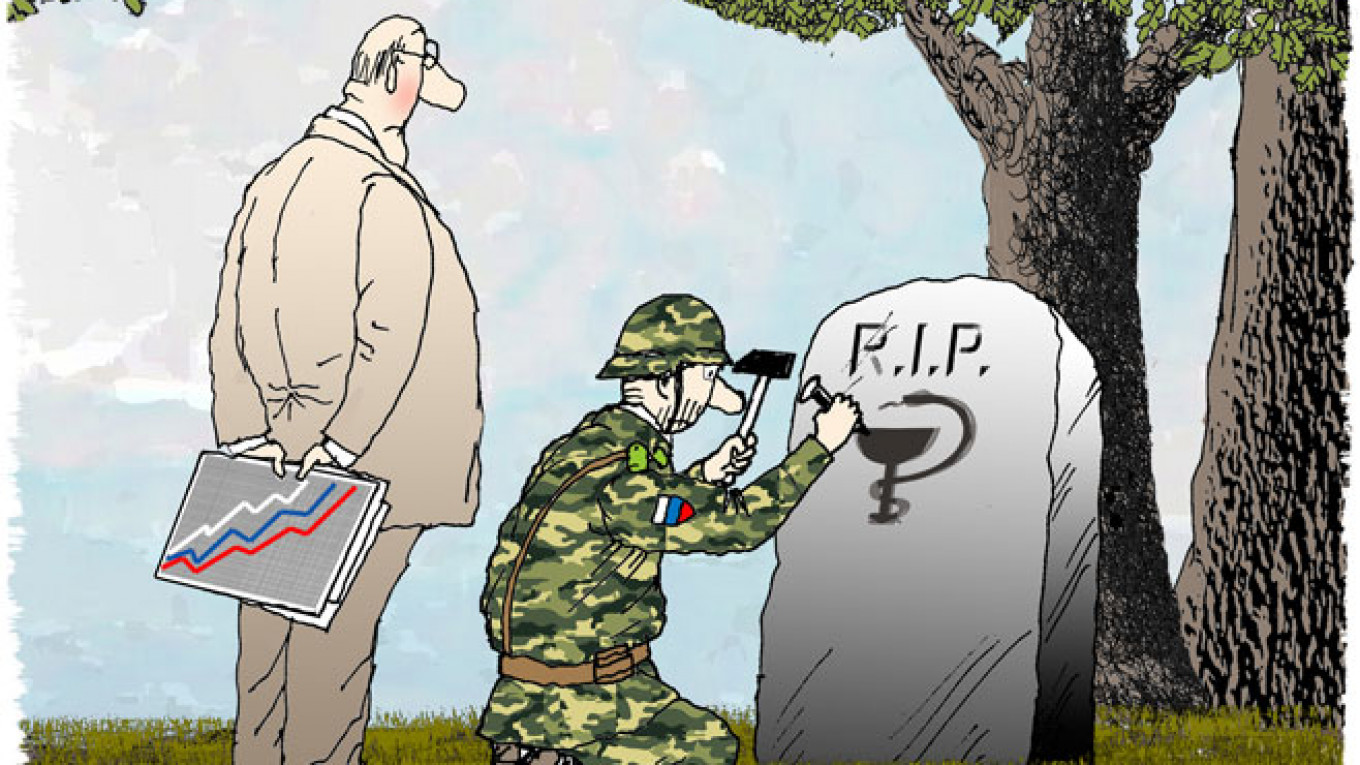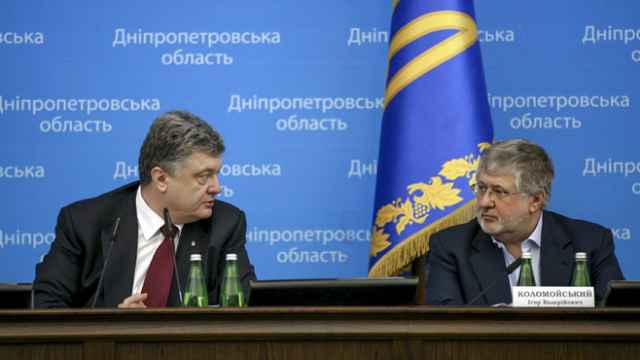Changes to the Russian national health care system have proceeded according to an obscure logic and led to very mixed results for medical personnel — and sometimes to lethal results for patients.
The authorities wanted to optimize and modernize the system by boosting the quality of medical care and making it more accessible. Instead, medical care has become inaccessible for a large part of the population, especially in rural areas: doctors labor under increased workloads, thereby compromising patient care; mortality in hospitals has increased; general morbidity is on the rise; and doctors are inundated with paperwork.
According to the State Statistics Service, from 2005 to 2013 the number of health facilities in rural areas fell by 75 percent, from 8,249 to 2,085. That number includes a 95 percent drop in the number of district hospitals, from 2,631 to only 124, and a 65 percent decline in the number of local health clinics, from 7,404 to 2,561.
According to Audit Chamber official Alexander Filipenko, 17,500 towns and villages now have no medical infrastructure whatsoever. Regional administrations originally planned to slash the number of rural health facilities and then convert them into offices staffed with general practitioners. They have already taken the first step, but even in many cities the second stage of the plan remains unfulfilled.
In place of small clinics and hospitals with ancient medical equipment, residents of the provinces were supposed to have gained access to treatment in hospitals with modern facilities. Instead, they were simply cut off from medical services entirely.
Now the residents of 11,000 population centers must travel more than 20 kilometers to reach the nearest doctor, but 35 percent of those towns and villages have no public transportation and almost 900 of them have no affiliation with any rural clinic or doctor's office at all.
The Audit Chamber reports that some regions even lack mobile medical teams to provide care in remote areas. When local train service was canceled to many smaller towns in the winter of 2013-14, residents of tiny Novosokolniki, Nevel and Opochka in the southern Pskov region literally lay down on the railroad tracks to force passing trains to stop and carry them to cities with hospitals.
In the cold logic of the accountant, the number of hospitals and clinics is "optimized" in order to cut costs. With all attention focused on the bottom line, nobody worries about the increased mortality, longer periods of illness, shorter healthy life spans and rise in disabilities that have resulted.
Those concerns get shuffled off to other government agencies or filed away for later review. Even the Kremlin's propaganda machine has refrained from mentioning government promises of improving the quality and accessibility of health care. Nobody has bothered explaining to doctors or to patients what principles are guiding the elimination and merging of medical facilities and staff, and how they can ensure that at least the quality of health care will not get worse.
In fact, the "optimization" process has affected not only "unprofitable" medical facilities, but even those with the latest equipment and the most highly qualified personnel. Moscow Cancer Hospital No. 62, one of the best of its kind in Russia, recently had to shutter an entire department even though patients were already waiting in line for weeks to receive treatment.
At Moscow Cancer Hospital No. 40, almost as many patients lie on gurneys in the halls and corridors as have beds in the rooms. This only compounds an already critical situation: According to the International Agency for Research on Cancer, Russia has one of the highest cancer mortality rates in the world.
And worse, the lack of early diagnosis in this country means that the number of patients with first- and second-stage cancer is actually much higher than those statistics reflect. Many cancer patients in Moscow and other regions who suffer from chronic pain see no other solution but to commit suicide, even while Russia's consumer watchdog Rospotrebnadzor and media watchdog Roskomnadzor struggle to suppress that information.
Moscow Deputy Mayor for Social Issues Leonid Pechatnikov suggested that the problem does not, in fact, stem from patients' inability to obtain painkillers. "Brain injury can cause mental disorders," he explained, "and so those suicides cannot be tied directly to chronic pain." How can doctors and patients continue their struggle in the face of such indifference?
The number of hospital beds has also fallen. Even as the birth rate increased from 2005 to 2013, the number of beds for expectant mothers fell by 8.5 percent, from 81,900 to 74,900, and even the number of hospital beds for children decreased by 13.1 percent from 200,300 to 173,900.
While the number of general physicians, surgeons, neurologists and radiologists rose, the number of pediatricians remains practically unchanged and the ranks of drug counselors and tuberculosis specialists declined. Apparently, Russia has conquered tuberculosis, the Federal Drug Control Service has whipped drug addiction and there is no need to even worry about alcoholism.
According to the Audit Chamber, the total number of doctors dropped by 2.2 percent in 2013-14, paramedics and nurses by 2.8 percent and orderlies by 5.3 percent. In all, the number of medical personnel has fallen by approximately 90,000. Meanwhile, the regions report a shortage of 55,000 doctors and 88,000 nurses, paramedics and orderlies.
That decline in medical personnel should have led to higher salaries for those who remained, but no significant change in compensation took place. Ill-considered layoffs and increased paperwork for receiving patients and issuing prescriptions has upset doctors, nurses and patients and their relatives, sparking a series of protests.
According to doctors in Voronezh, a regional capital south of Moscow, many physicians have quit over the increased bureaucratic supervision and paperwork, thus leading to longer lines at the clinics.
The doctors protest to preserve decent working conditions, and patients to preserve decent treatment. As many as 3,235 physicians, or 0.6 percent of all doctors in Russia, have already signed the Russian Doctors' Declaration of Independence published in 2014 that calls for an end to the ill-considered reforms in health care and the interference of the state and insurers in the process of providing care.
In the summer of 2014, the parents of a child receiving treatment in the Russian Children's Clinical Hospital in Moscow staged a hunger strike, in December residents of Zelenograd, a town outside Moscow, managed to prevent the authorities from closing the office of a physical therapist in one clinic, and in 2015, 30 doctors from seven clinics in the capital and the Moscow region resorted to a sit-down strike.
Among their demands: an end to cuts in medical staff, a reduced workload for primary care physicians and more time for treating each patient.
One clinic managed to increase the average time doctors spend with patients from 10 to 12 minutes — the minimum required just to fill out the necessary paperwork. Another clinic managed to wrest 20 minutes for each patient, while officials have promised to pay overtime to doctors in a third clinic.
Medical personnel waging work and hunger strikes have become a familiar scene in Ufa, a regional capital in the Urals region, where they are locked in a protracted conflict with local authorities. On Monday, Svetlana Yusupova, the director of a small medical clinic, was taken to the hospital in serious condition. She and nine others have been on a hunger strike since March 19. They are demanding, among other things, that the authorities cease pressuring them and the dismissal of the head doctor of the clinic.
Physicians at the Peter the Great Hospital in St. Petersburg staged a hunger strike in January 2014, and at the Filatov Pediatric Hospital in that city parents have been struggling since late last year to preserve a ward containing equipment essential to treating acute heart disease and cerebral circulatory problems.
By contrast, residents in remote areas do not stage protests. Their numbers are too few to create a mass movement, and it is useless to stage a demonstration that nobody will see or care about.
Russia's senior health care officials seem completely unaware of this reality. Just days ago, and after the Audit Chamber published its alarming report, Health Minister Veronika Skvortsova cheerily conveyed the results of optimization to President Vladimir Putin.
Funding for health care is up by 200 billion rubles ($4 billion) in 2015, she told him, "and that level of funding is enough to not only maintain health care at last year's level, but will enable us to expand if we manage to keep down the price of drugs and medical implants."
Skvortsova also reported that from 1991 to 2014 infant mortality had fallen to one-third of its former level and maternal mortality to one-fourth, that cancer detection was up by between 50 and 70 percent over the previous year, that the number of rural medical facilities had actually increased and that the level of high-technology medical care available had dramatically increased.
She also said that 67 percent of all vitally important drugs are now produced in Russia, and that by 2020 that number should reach 90 percent.
After hearing this report, Putin did not pose a single difficult question to Skvortsova. Apparently, he remains unaware of the problems mentioned in this article. What's more, he will remain unaware unless he meets with Audit Chamber head Tatyana Golikova and questions her on medical issues.
And he certainly will not learn the truth if he speaks to Deputy Prime Minister Olga Golodets, who echoed Skvortsova, blithely telling conference participants at the Higher School of Economics, "The total number of doctors in Russia is growing, and will continue to grow," "Russia's health care sector is developing vigorously," "In every region now, health care is developing through the partnership between state and private providers."
Any country at war and almost single-handedly fending off the overwhelming array of evil forces leagued against it cannot afford to spend much money on health care. The situation is therefore likely to deteriorate.
The federal center is shifting the health care burden to regional budgets, where, in contrast to Moscow, they have no petrodollars at their disposal. According to HSE professor Larisa Popovich, under such conditions the only solution is to introduce barriers limiting access to health care.
If the government cannot or will not increase the supply of health care services, it must reduce demand by instituting bureaucratic controls and rejecting insurance claims. In the end, doctors will take the blame for poisoning the system and the authorities will charge a fee for all medical services and drugs — even those used in hospitals.
Officials and doctors have been unable to establish the mutual dialogue necessary to "cure" Russia's health care system. The many doctors who are unwilling to consign their fate to government officials are forced to rely on their own resources.
Cardiologist Maxim Osipov of Tarusa Hospital in the Kaluga Region told Radio Svoboda that the survival of hospitals depends on the ingenuity of their staff and on charitable aid. He said the Tarusa Hospital has its own "relief society" that collects enough money to maintain the hospital's day-to-day functions.
However, that approach will not work everywhere. All other doctors and patients will just have to hope that Russia's health care system will survive the current reforms.
The authors are columnists at Vedomosti. This comment originally appeared in Vedomosti.
A Message from The Moscow Times:
Dear readers,
We are facing unprecedented challenges. Russia's Prosecutor General's Office has designated The Moscow Times as an "undesirable" organization, criminalizing our work and putting our staff at risk of prosecution. This follows our earlier unjust labeling as a "foreign agent."
These actions are direct attempts to silence independent journalism in Russia. The authorities claim our work "discredits the decisions of the Russian leadership." We see things differently: we strive to provide accurate, unbiased reporting on Russia.
We, the journalists of The Moscow Times, refuse to be silenced. But to continue our work, we need your help.
Your support, no matter how small, makes a world of difference. If you can, please support us monthly starting from just $2. It's quick to set up, and every contribution makes a significant impact.
By supporting The Moscow Times, you're defending open, independent journalism in the face of repression. Thank you for standing with us.
Remind me later.






